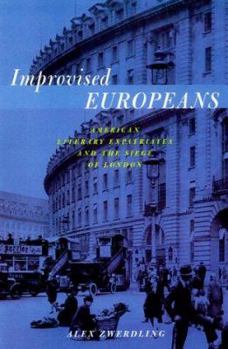Improvised Europeans: American Literary Expatriates in London
Select Format
Select Condition 
Book Overview
At the turn of the century the United States seemed poised to overtake its European rivals on all fronts; its many strengths were finally being recognized--the wealth of resources, the profusion of... This description may be from another edition of this product.
Format:Paperback
Language:English
ISBN:0465032761
ISBN13:9780465032761
Release Date:April 1999
Publisher:Basic Books
Length:400 Pages
Weight:0.89 lbs.
Dimensions:1.0" x 6.8" x 9.2"
Customer Reviews
1 rating
Assuming the Mantle of Modernism
Published by Thriftbooks.com User , 24 years ago
Through the exploration of the lives and works of four profoundly influential American literary "insurgents," Zwerdling tells the story of their transgenerational fight to clear a space for the recognition of the worthiness American literature among English and European elites. Engaging, thought-provoking and often surprisingly moving, we follow the expatriate careers of Henry Adams and Henry James in the mid to late 19th and early 20th century, followed by the modernist careers of Pound and Eliot in the early to middle 20th century. Zwerdling makes an extremely good case for cultural power's linkage to economic power by showing how Adam's and James cultivated reputations in both the U.S. and England, laying the groundwork for a idea of a shared Anglo-Saxon Literature just at the time when America was becoming recognized as having usurped England's role as the world's most vital economic and cultural power. Pound and Eliot build on the foundations laid by Adams and James, fully confident that as Americans they will no longer be treated as second-class literary citizens. They employ different strategies in their own "siege of London" but Eliot to a large degree succeeds in becoming the final arbiter of all literary disputes and grand critic of modernist literature. As America takes center stage at the end of WWII, American's version of world modernist literature and culture, not surprisingly, come to predominate forming the core of the canon of Modern Literature as taught in the University. The literary insurgency takes it's toll on all four of our literary heroes, however. Adams comes to despise much of English culture and mores. James does his best writing after a long-delayed trip back to America after nearly a lifetime abroad, writings that imaginatively explore what kind of man he might have become had he stayed in his native land. Pound wears out London literary society in a few short years and abandons the field. Eliot adopts the manners of a high-toned Englishman to such an extent that he sets back the appreciation of other American writers thirty years (according to William Carlos Williams). Nevertheless, he too, writes some of his best later work after a visit to America. In becoming expatriates they wander far afield of their original inspiration. In becoming accepted, they lose some of the insurgent edge. Of all of these James remains the most alive to the stirrings of new possibilities and the shifting relations of power between Americans and English elites.





